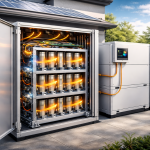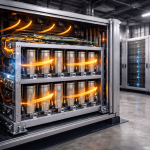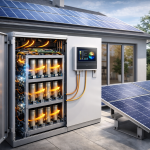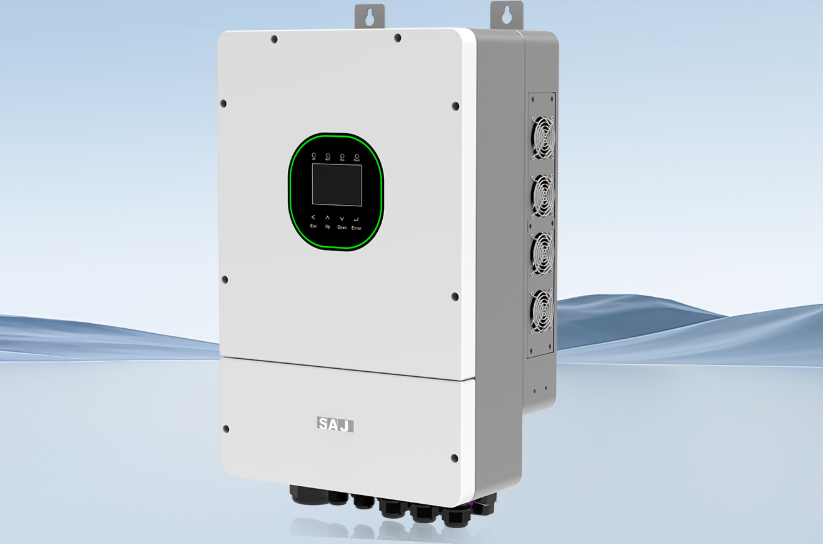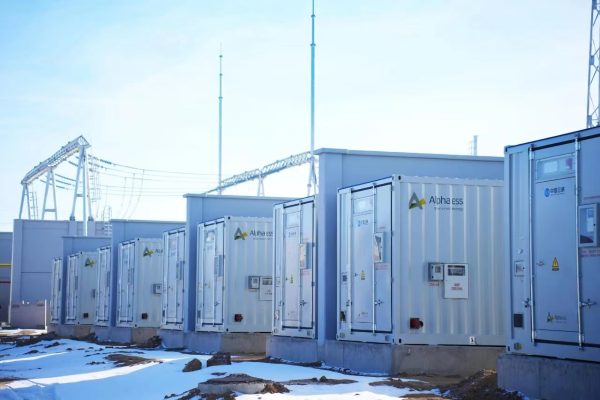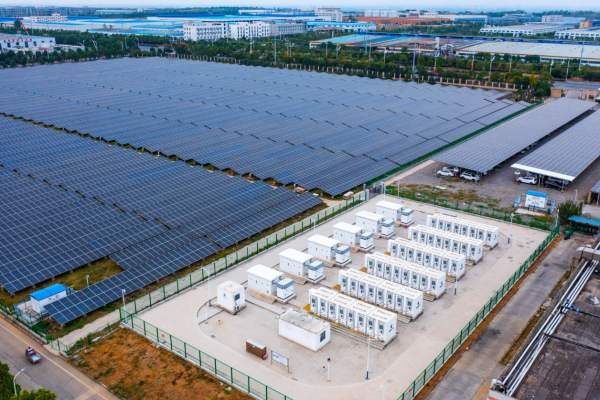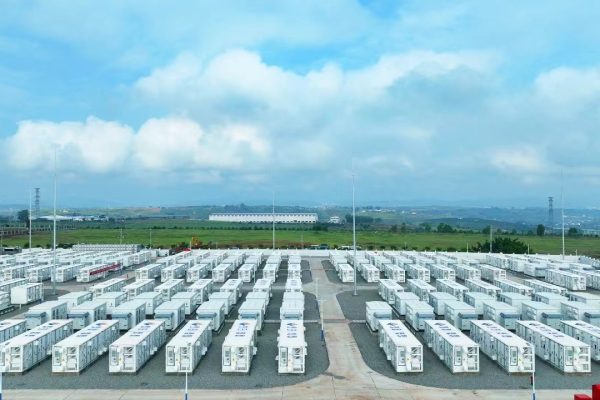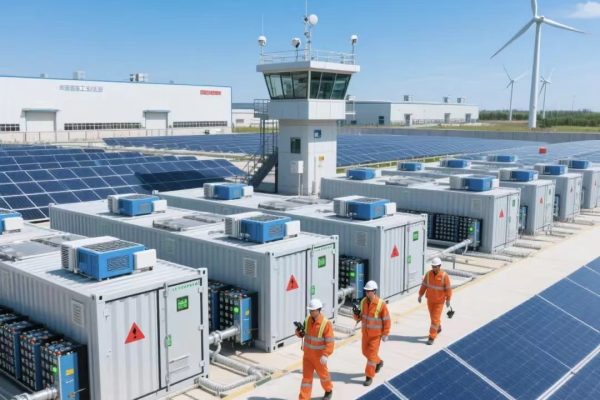🔍 Introduction: Why the Right Inverter Choice Matters
When planning a solar power or energy storage system, selecting the right type of inverter is one of the most crucial decisions. Whether you’re designing a residential rooftop system, a remote cabin, or a commercial energy solution, your inverter determines:
- How your system interacts with the grid
- Whether batteries are needed
- What loads you can support
- How much independence you gain
The two most common inverter types — off-grid and on-grid (grid-tied) — serve very different purposes. In this article, we’ll explore the differences, typical applications, and decision factors, helping you choose the best fit for your project.
🔌 What Is an On-Grid Inverter?
⚙️ Definition:
An on-grid inverter, also known as a grid-tied inverter, is designed to work in parallel with the utility grid. It converts DC power from your solar panels into AC power that is directly fed into the grid.
✅ Key Characteristics:
- Requires a stable grid connection to function
- No battery needed (though optional with hybrid versions)
- Net metering allows excess power to be exported
- Will shut down during a blackout (anti-islanding protection)
📦 Ideal For:
- Urban homes or businesses with reliable grid access
- Net metering programs where selling electricity is beneficial
- Reducing energy bills without going fully off-grid
📈 Pros:
- Lower upfront cost
- High efficiency
- Simple design, easy maintenance
⚠️ Cons:
- No backup power during grid outages
- Complete reliance on grid stability
🔋 What Is an Off-Grid Inverter?
⚙️ Definition:
An off-grid inverter is designed for standalone solar systems that function independently of the utility grid. These systems rely on batteries to store energy and often include backup generators.
✅ Key Characteristics:
- Does not require a grid connection
- Must be paired with a battery storage system
- Intelligent load and charging management
- Works even in remote or unstable areas
📦 Ideal For:
- Remote homes or cabins with no grid access
- Telecom towers, farms, or mines in rural areas
- Critical applications that need power independence
📈 Pros:
- Total energy independence
- Reliable power even in blackouts
- Ideal for rural electrification
⚠️ Cons:
- Higher cost due to batteries
- System sizing must be precise to avoid outages
- More complex installation and maintenance
🔄 The Hybrid Inverter: Best of Both Worlds?
If you’re not fully satisfied with either solution, there’s a third option — the hybrid inverter, which blends the functionality of both on-grid and off-grid systems.
A hybrid inverter:
- Can operate with or without the grid
- Supports battery storage for backup or energy shifting
- Enables smart energy management and time-of-use optimization
📌 Internal link recommendation:
Read more: How to Choose a Hybrid Inverter for Small-Scale PV Projects
(Add internal link once the article is published on your blog.)
🔍 Detailed Comparison Table
| Feature | On-Grid Inverter | Off-Grid Inverter | Hybrid Inverter |
|---|---|---|---|
| Requires Grid | ✅ Yes | ❌ No | Optional |
| Works During Outage | ❌ No | ✅ Yes | ✅ Yes |
| Battery Required | ❌ No | ✅ Yes | Optional |
| Net Metering Support | ✅ Yes | ❌ No | ✅ Yes |
| Initial Cost | 💲 Low | 💲💲💲 High | 💲💲 Medium-High |
| Ideal Use Case | Urban, low budget | Remote, critical power | Mixed-use, flexible control |
📌 Application Scenarios and Use Cases
🏠 1. Residential Solar in Urban Areas:
Best Choice: On-Grid Inverter
If you’re in a city with reliable electricity and access to net metering, an on-grid inverter offers the simplest and most cost-effective setup.
🏡 2. Rural Homes or Cabins:
Best Choice: Off-Grid Inverter
No access to the grid? You need full autonomy. An off-grid inverter, combined with sufficient battery capacity and possibly a diesel generator, is the answer.
🏢 3. SMEs or Stores in Urban Areas:
Best Choice: Hybrid Inverter
For small businesses that want grid interaction but also backup power (e.g., retail shops, clinics, or offices), hybrid inverters offer resilience and optimization.
🏗️ 4. Industrial Projects in Remote Zones:
Best Choice: Off-Grid or Hybrid
For mining sites, telecom stations, or agricultural processing in remote areas, off-grid or hybrid inverters ensure consistent energy delivery.
🔍 Factors to Consider When Choosing
✅ 1. Grid Availability
If you’re located in a grid-connected region, it doesn’t mean you should ignore storage — frequent outages may justify a hybrid system.
✅ 2. Budget and ROI
On-grid systems have lower CAPEX, but off-grid or hybrid options provide higher reliability and energy security, which could mean more value in the long run.
✅ 3. Load Profile
Understanding your energy use (day vs. night, peak loads, etc.) helps determine battery needs and inverter sizing.
✅ 4. Regulatory Environment
In some regions, net metering policies or feed-in tariffs make grid-tied systems more attractive. Elsewhere, energy independence may be prioritized.
✅ Summary: Which One Is Right for You?
| You should choose… | If you… |
|---|---|
| On-Grid Inverter | Want a cost-effective system in a reliable grid area |
| Off-Grid Inverter | Need full autonomy in remote/off-grid locations |
| Hybrid Inverter | Want both grid support and energy storage flexibility |
📞 Conclusion: Let Experts Help You Match the Right Solution
Selecting the correct inverter is more than a technical decision — it’s a business decision. Whether you’re working on a rooftop project for a small business, designing off-grid systems for rural installations, or integrating batteries into a hybrid setup, choosing the right inverter type will determine the success and stability of your entire system.
At GR-NewEnergy, we help project owners, installers, and distributors match the best-fit inverter for their applications. With access to a flexible supply chain, hybrid inverter sourcing, and engineering guidance, we support your energy transition, one project at a time.
📌 Looking for a hybrid inverter or tailored off-grid system?
Contact our technical team →

